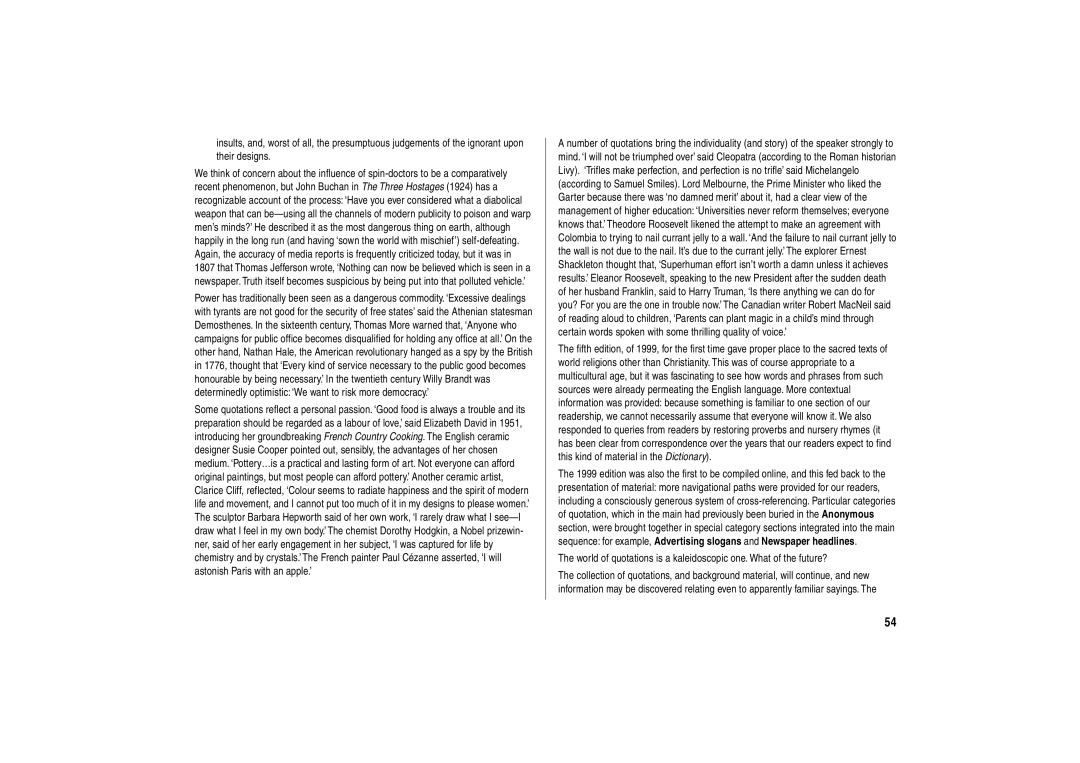insults, and, worst of all, the presumptuous judgements of the ignorant upon their designs.
We think of concern about the influence of
Power has traditionally been seen as a dangerous commodity. ‘Excessive dealings with tyrants are not good for the security of free states’ said the Athenian statesman Demosthenes. In the sixteenth century, Thomas More warned that, ‘Anyone who campaigns for public office becomes disqualified for holding any office at all.’ On the other hand, Nathan Hale, the American revolutionary hanged as a spy by the British in 1776, thought that ‘Every kind of service necessary to the public good becomes honourable by being necessary.’ In the twentieth century Willy Brandt was determinedly optimistic: ‘We want to risk more democracy.’
Some quotations reflect a personal passion. ‘Good food is always a trouble and its preparation should be regarded as a labour of love,’ said Elizabeth David in 1951, introducing her groundbreaking French Country Cooking. The English ceramic designer Susie Cooper pointed out, sensibly, the advantages of her chosen medium. ‘Pottery…is a practical and lasting form of art. Not everyone can afford original paintings, but most people can afford pottery.’ Another ceramic artist, Clarice Cliff, reflected, ‘Colour seems to radiate happiness and the spirit of modern life and movement, and I cannot put too much of it in my designs to please women.’ The sculptor Barbara Hepworth said of her own work, ‘I rarely draw what I
A number of quotations bring the individuality (and story) of the speaker strongly to mind. ‘I will not be triumphed over’ said Cleopatra (according to the Roman historian Livy). ‘Trifles make perfection, and perfection is no trifle’ said Michelangelo (according to Samuel Smiles). Lord Melbourne, the Prime Minister who liked the Garter because there was ‘no damned merit’ about it, had a clear view of the management of higher education: ‘Universities never reform themselves; everyone knows that.’ Theodore Roosevelt likened the attempt to make an agreement with Colombia to trying to nail currant jelly to a wall. ‘And the failure to nail currant jelly to the wall is not due to the nail. It’s due to the currant jelly.’ The explorer Ernest Shackleton thought that, ‘Superhuman effort isn’t worth a damn unless it achieves results.’ Eleanor Roosevelt, speaking to the new President after the sudden death of her husband Franklin, said to Harry Truman, ‘Is there anything we can do for you? For you are the one in trouble now.’ The Canadian writer Robert MacNeil said of reading aloud to children, ‘Parents can plant magic in a child’s mind through certain words spoken with some thrilling quality of voice.’
The fifth edition, of 1999, for the first time gave proper place to the sacred texts of world religions other than Christianity. This was of course appropriate to a multicultural age, but it was fascinating to see how words and phrases from such sources were already permeating the English language. More contextual information was provided: because something is familiar to one section of our readership, we cannot necessarily assume that everyone will know it. We also responded to queries from readers by restoring proverbs and nursery rhymes (it has been clear from correspondence over the years that our readers expect to find this kind of material in the Dictionary).
The 1999 edition was also the first to be compiled online, and this fed back to the presentation of material: more navigational paths were provided for our readers, including a consciously generous system of
The world of quotations is a kaleidoscopic one. What of the future?
The collection of quotations, and background material, will continue, and new information may be discovered relating even to apparently familiar sayings. The
54
